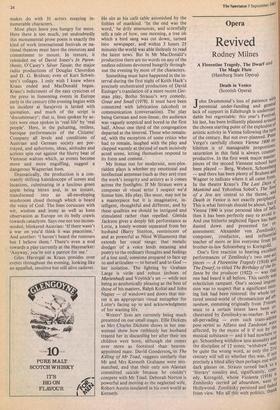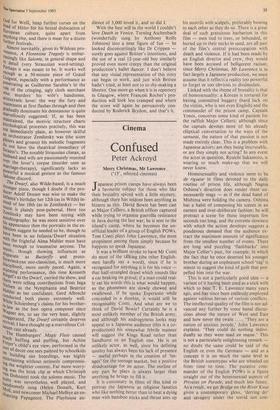Opera
Revived
Rodney Milnes
A Florentine Tragedy, The Dwarf and The Magic Flute (Hamburg State Opera)
Death in Venice (Scottish Opera)
John Drummond's loss of patience wita, perennial under-funding and genera' lack of support in Edinburgh is understeir dable but regrettable: this year's Festival: his last, has been brilliantly planned aroundr the chosen starting point of the explosion 0 artistic activity in Vienna following the turn of the century. But not over-planned. Peter Vergo's carefully chosen Vienna 1900 ex- hibition is of manageable proportions. saturation in this field is always counter' productive. In the first week major master: pieces of the second Viennese school have been played — Berg, Webern, SchoenberS — and there has been plenty of Brahms and Wagner to indicate where it all came frolu., In the theatre Kraus's The Last Days W Mankind and Yehoshua Sobol's The Soitc of a Jew are central to the theme, a°, Death in Venice is not exactly periphers!. This is what festivals should be about, but tf Vienna 1900 is your personal idea of he!'' then it has been perfectly easy to avoid it. And one hitherto neglected figure has been dusted down and presented for re" assessment: Alexander von Zemlinsky; composer, conductor, and influential teacher of more or less everyone from Ills brother-in-law Schoenberg to Korilgold. One's first reaction to hearing excellent performances of Zemlinsky's two one-ad pieces — A Florentine Tragedy (1916) an The Dwarf, re-titled The Birthday of the m• fanta by the producer (1922) — was that one had heard it all before. This surely Was eclecticism rampant. One's second imPres' sion was to suspect that a significant Miss' ing link had been restored: the whole tor' tured sound-world of chromaticism ad ah. surdum, stemming originally from Tristan. mist to a certain extent have been or chestrated by Zemlinsky-as-teacher. It Was all-pervading — even such trans-elPlae post-veristi as Alfano and Zandonai were affected, by the excess of it if not by the musical substance -- and it had nowhere in, go. Schoenberg withdrew into atonality an the discipline of 12 notes; 'withdrew' 0.1,9 be quite the wrong word, as only the 21t century will tell us whether this was, if 1.1a,, precisely a blind alley then perhaps one wit" dark glasses on. Strauss turned back to a 'literary' tonality and, significantly, etlri- edy. Korngold, whose Violanta (1916) Is Zemlinsky carried ad absurdum, went to, Hollywood. ZemlinSky persisted and fade? from view. Mix all this with politics, thank Cod for Weill, heap further curses on the head of Hitler for his brutal dislocation of European culture, quite apart from PtlYthing else, and there is meat for a dozen
urther festivals. Almost inevitably, given its Wildean pro-
venance, A Florentine Tragedy is embar- rassingly like Salome, in general shape and 1,0 detail (very Straussian word-setting). Perhaps it was meant to be. It works well enough as a 50-minute piece of Grand
ngnol, especially with a performance as
Penetrating as Guillermo Sarabia's in the role of the cringing, ugly cloth merchant who murders his wife's handsome, aristocratic lover: the way the fury and resentment at first flashes through and then gradually dominates his demeanour is quite marvellously suggested. If, as has been maintained, the motivic structure charts psychological processes precisely, this was not immediately plain, as however skilful an. orchestrator Zemlinsky was (the score glitters and groans) his melodic fragments do not have the theatrical immediacy of ?trauss's. The notably Straussian climax, as husband and wife are passionately reunited Oyer the lover's corpse (murder seen as rnarriage-therapy), significantly lacks so powerful a musical gesture as the famous 'satorne discord. The Dwarf, also Wilde-based, is a much stronger piece, though I doubt if the pro- ducer Adolf Dresen was wise to make the i litanta's birthday her 12th (as in Wilde) in- stead of her 18th (as in Zemlinsky) — her music is plainly post-pubertal. Here too s'ettliinsky may have been toying with autobiography: he was more sensitive over k!apPlearance then the portraits in the ex- hibition suggest he needed to be, though to have been in an Infanta/Dwarf situation with the frightful Alma Mahler must have been enough enough to traumatise anyone. The disparate though showing influences as s',IsParate as Butterfly and proto- Stravinskyan neo-classicism, is much more disciplined, more surely paced. Again, a stunning performance, this time Kenneth li there egel's as the Dwarf, carried the show, and were telling contributions from Inga Nielsen as the Nymphanta and Beatrice li aldns as her confidante. Gerd Albrecht conducted both pieces extremely well. • -he Schcenberg's claims for his brother- Vaaw as the best opera composer since gner are, to say the very least, slightly 1,)(aera, The Dwrf certainly deserve ievIv4al; Ited have thoughta up a marvellous Col- s setiln cast already. The Hamburgers' Magic Flute caused illett huffing and puffing, but Achim „ reYer's child's eye view, performed in the ',,ort of decor one sees painted by schoolkids `_'n building site hoardings, was highly entertaining without seriously compromis- ing the weightier content. Far more worry- vg was the brisk clip at which Christoph
Dohnanyi took the solemn music. The
'core was nevertheless well played, and handsomely sung (Helen Donath, Kurt N 11, and newcomer Michael Melbye an en- chanting Papageno). The Playhouse au-
dience of 3,000 loved it, and so did I.
With the best will in the world I couldn't love Death in Venice. Turning Aschenbach (wonderfully sung by Anthony Rolfe Johnson) into a near figure of fun — he looked disconcertingly like Dr Crippen surely goes against Britten's intentions, and the use of a real 12-year-old boy similarly proved even more creepy than the original production's ballet dancer. 1 don't believe that any visual representation of this story can begin to work, and just wish Britten hadn't tried, at least not to so shy-making a libretto. One more go when it is in repertory in Glasgow, where Francois Rochet's pro- duction will look less cramped and where the score will again be persuasively con- ducted by Roderick Brydon, and that's it.



































 Previous page
Previous page